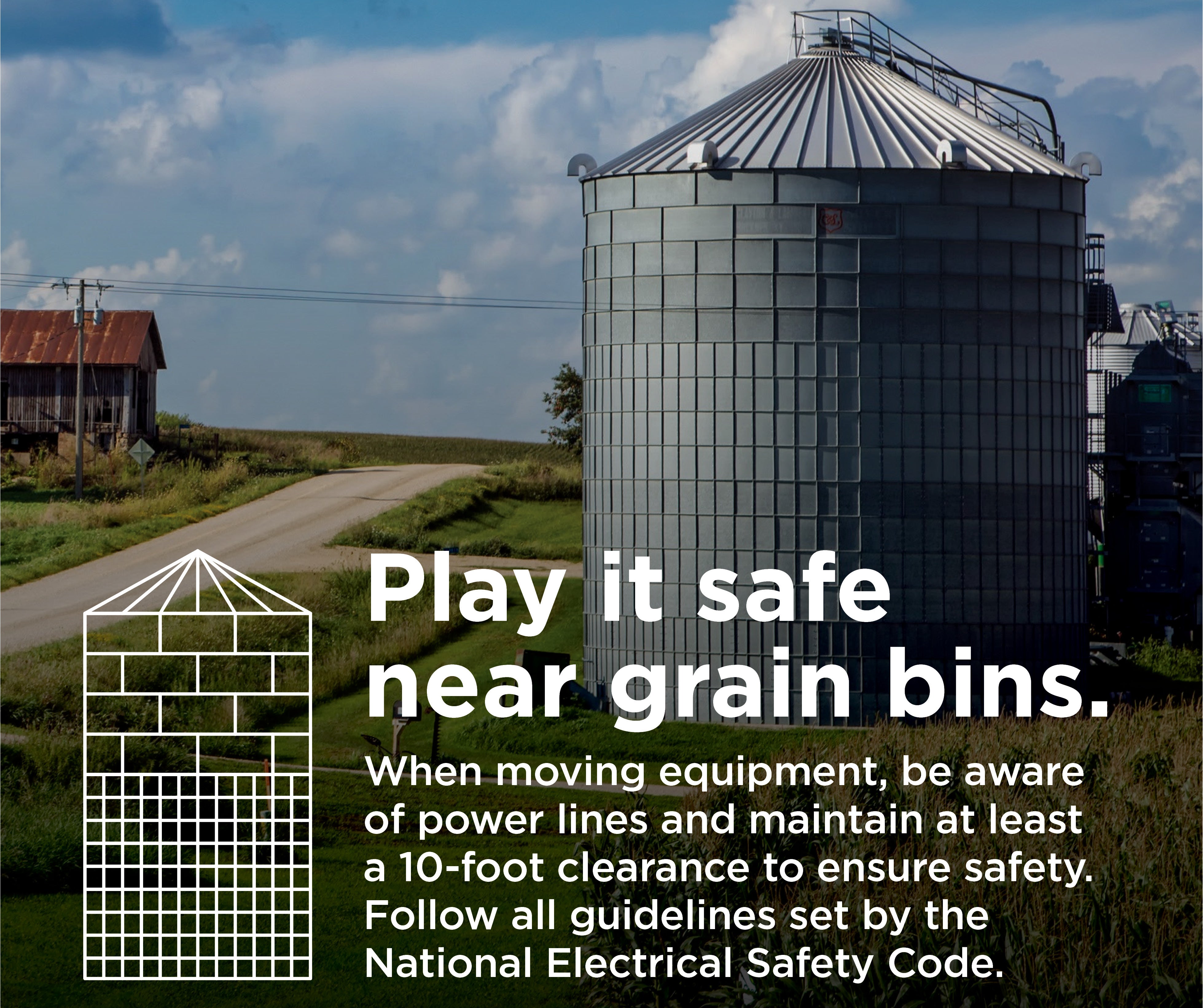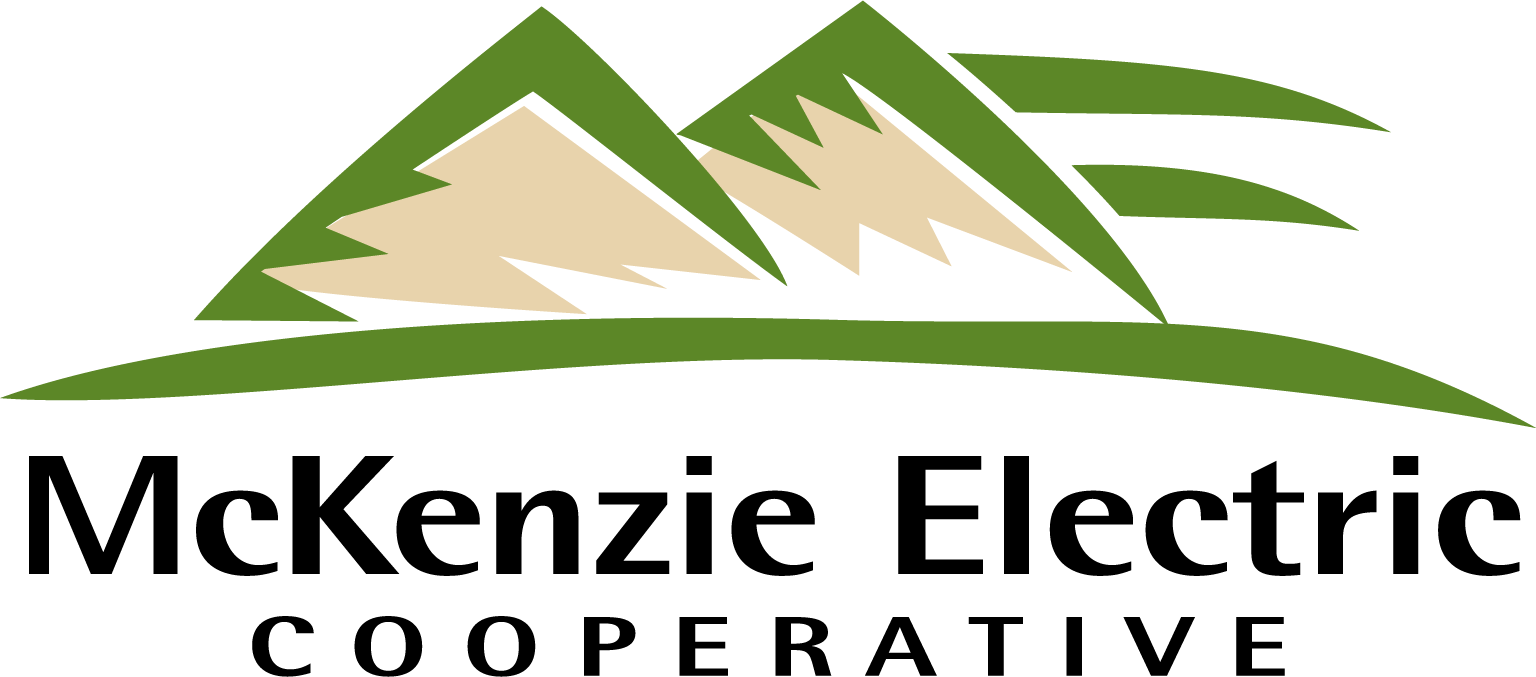Farm & Ranch Safety
Electrical Distribution Awareness
We don’t have to remind those who work the land and raise livestock that they have a potentially dangerous occupation. However, due to the nature of the job, and because of long days and tiring work, here are some reminders about electrical dangers on the farm or ranch.
Overhead power lines
If you make contact with a power line, guy wire, power pole, electrical box or any other electrical equipment, do not get out of your cab or truck. Stay put and call 9-1-1 to dispatch our lineworkers or the local utility to de-energize the power. If you can, provide dispatch with detailed location information, this will help determine who’s service territory you’re within. If you must get out due to smoke or fire, make a solid jump out without touching any part of the tractor or vehicle, and hop away as far as you can, keeping both feet together as you hop. Another option (after you make a clean exit) is to shuffle or waddle away while keeping your feet together and on the ground.
Once you are out, never try to re-enter the cab or truck.
Remember: If your machinery or vehicle comes in contact with a power line or other utility equipment, do not get out of the cab. Stray power could energize your equipment and the ground. Call 9-1-1 and wait for line crews to arrive and cut the power so that you can safely exit your tractor or vehicle.
Determine proper clearance
Contact us to measure power line heights; do NOT do this yourself. Once you know the heights, you can determine appropriate equipment, implement and extension clearances. Always maintain at least 10 feet between the power line and the tallest height of the equipment that will be transported.
Keep in mind that due to wear, age and even weather conditions, power lines can change height. Many of our poles have been straightened and lines tightened as part of our April storm restoration but there may be a few spans that have loosened or are involved in ongoing construction. Please contact us with any concerns. It’s good to know power line clearance, but always have a spotter.
Call us before moving or adding a grain bin
 The National Electrical Safety Code addresses grain bins and their proximity to power lines with very specific requirements. The requirements are in place to help keep farmers safe: to decrease the chances of farming equipment and machinery coming in contact with power lines. If you are planning on building a new grain bin or remodeling around an area that already has one, please contact McKenzie Electric at 701-444-9288. We can help with specific code requirements. The taller a grain bin, the farther it must be placed from a power line.
The National Electrical Safety Code addresses grain bins and their proximity to power lines with very specific requirements. The requirements are in place to help keep farmers safe: to decrease the chances of farming equipment and machinery coming in contact with power lines. If you are planning on building a new grain bin or remodeling around an area that already has one, please contact McKenzie Electric at 701-444-9288. We can help with specific code requirements. The taller a grain bin, the farther it must be placed from a power line.
Always dig safely
Whether you are installing new fence posts or using large tillage tools, call 811 before you dig to have underground utilities marked. Even if you think you know where buried gas, power and other lines are, don’t rely on your memory. Get all utilities marked so that you know for sure. Not only is it paramount to your safety, it’s the law. Utility locators dispatched by 811 do not mark private lines.
Use standby generators with care
If you have a standby generator to provide essential power during an outage, be sure to correctly use the transfer switch. Once you properly engage the switch, it stops your farm’s generated power from entering utility lines, aka backfeeding, which can electrocute lineworkers who are working to restore power.
For more information about generator safety and avoiding backfeeding, call 701-444-9288 and ask to speak to the engineering department.
General Safety
- Check and maintain equipment, especially electric cables and hydraulic hoses that have cracks or show other signs of wear.
- Always have someone nearby when entering grain bins or other high-risk areas.
- Check all buildings and grounds for fire hazards and hazardous materials.
- Assess how any chemicals are stored and make sure children and animals can’t access them.
- Make a list of chemicals for firefighters in case a fire breaks out on your farm or ranch.
- Establish a safety boundary around gas and fuel tanks.
- Don’t skimp on safety: wear eye and ear protection, gloves, and face masks and respirators when appropriate.
- Shield all PTO-powered machinery and keep others away.
- Outfit tractors and trucks with fire extinguishers.
- Never exit a tractor or truck without placing it in park or engaging the emergency brakes.
- Discuss safety concerns with children and explain safe operating procedures. You can never start too young, and they watch what you do.
General safety tips source: Hobby Farms
